Welcome back to This Week in Apps, the weekly TechCrunch series that recaps the latest in mobile OS news, mobile applications and the overall app economy.
The app industry is as hot as ever, with a record 218 billion downloads and $143 billion in global consumer spend in 2020.
Consumers last year also spent 3.5 trillion minutes using apps on Android devices alone. And in the U.S., app usage surged ahead of the time spent watching live TV. Currently, the average American watches 3.7 hours of live TV per day, but now spends four hours per day on their mobile devices.
Apps aren’t just a way to pass idle hours — they’re also a big business. In 2019, mobile-first companies had a combined $544 billion valuation, 6.5x higher than those without a mobile focus. In 2020, investors poured $73 billion in capital into mobile companies — a figure that’s up 27% year-over-year.
This week we’re looking at the launch of Apple’s ATT, the Facebook and Spotify team-up and the latest from the EU’s antitrust investigation against Apple.
This Week in Apps will soon be a newsletter! Sign up here: techcrunch.com/newsletters
Here Comes ATT
Apple’s public debut of App Tracking Transparency, or ATT, is the news of the week and possibly of the year. Through a small pop-up message asking users if the app can track them, Apple has disrupted a multibillion-dollar adtech industry, altered the course of tech giants like Facebook and drawn possible lawsuits and antitrust complaints, all in the name of protecting consumer privacy. Apple does believe in privacy and user control — you can tell that from the way the company has built its technology to do things like on-device processing or permissions toggles that let people decide what their apps can and cannot do.
But Apple will also benefit from this particular privacy reform, too. Its own first-party apps can collect data and share it with other first-party apps. That means what you do in apps like the App Store, Apple News, Stocks and others can be used to personalize Apple’s own ads. And the company is prepared to capitalize on this opportunity too, with the addition of a new ad slot on the App Store (in the Suggested section on the Search tab.) If it wants to roll out more ads over time to other businesses — perhaps, those podcasts it got newly interested in after Spotify did? Or in its streaming TV service or fitness solution? Perhaps the ads it sells in Apple News? — then it would have access to valuable data it could use. Oh and the next time you open the App Store or Apple News, you won’t be bothered with one of those pesky warnings! Nope — that’s only for third-parties, a very important distinction! If you want to turn off Apple’s own ability to track you across its growing number of apps, that’s at the VERY bottom of iOS’s Privacy Settings.
We heard you like Spotify, so we put Spotify in your Facebook app
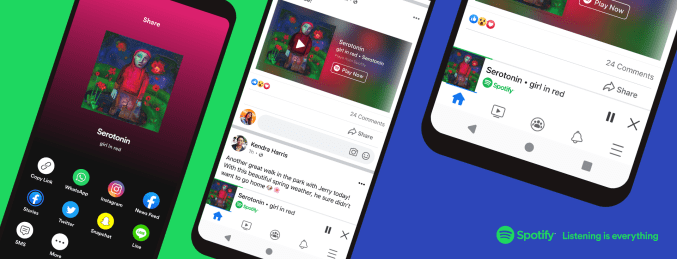
Image Credits: Spotify
Facebook and Spotify expanded their partnership this week. The companies had earlier announced their plans to make it easier for Facebook users to stream music and podcasts from the Facebook app. On Monday, this integration began rolling out in the form of a miniplayer experience that allows Facebook users to stream from Spotify through the Facebook app on iOS or Android.
The feature is available to both free and paying Spotify users and will allow them each to hear the full song or podcast episode being shared. However, free users will then be moved into “shuffle” mode if they continue to listen after the song plays.
What’s interesting about this integration is that it’s not actually streaming Spotify through Facebook. The miniplayer activates and controls the launch and playback in the Spotify app — which is how the playback is able to continue even as the user scrolls on Facebook or if they minimize the Facebook app altogether. This gives the appearance of Facebook doing the streaming. (Songs on social! Cue Myspace vibes!)
Spotify says users can’t upgrade to Spotify Premium from the miniplayer directly, so there’s no rev share there. It’s also paying the royalties on streams, as usual. But it’s getting massive distribution through Facebook, driving signups and repeat usage, while Facebook gets a way to keep users on its app longer. Win-win. Not coincidentally, both companies now share a common enemy with Apple, whose privacy-focused changes are impacting Facebook’s ad business and whose investments in Apple Music and Podcasts are a threat to Spotify.
Platforms: Apple
Russia’s Federal Antimonopoly Service (FAS) fined Apple $12.1 million for alleged app market abuse, saying Apple gave its own products a competitive advantage.
✨ The EU is charging Apple for its anticompetitive behavior this week, nearly two years after Spotify filed its first complaint about the App Store and Apple Music. The European Commission last year opened its antitrust investigation into Apple’s business, which is also now under fire in the U.S. for similar matters.
On Friday, the European regulators stated that Apple has “abused its dominant position” in the distribution of music streaming services on the App Store, and called it a “monopoly.” The EU doesn’t think Apple should be able to force developers to use its own in-app purchase mechanism nor should it be able to restrict them from telling users where else they can pay — like the developer’s own website, for example.
Spotify founder Daniel Ek seemed happy with the news:

Image Credits: TC
Apple is correct in pointing out that Spotify has built a massive business — which to be fair, was built both on and off the App Store. But it’s claiming a pretty big hand in that. The EU’s belief, meanwhile, is that Spotify might have been even more successful if Apple hadn’t imposed the restrictions it did, and that other smaller, streaming competitors are being harmed, too, but don’t have the power to speak up.
Now that ATT is live, Apple warns developers that it will ban apps from its App Store that offer rewards to users that enable tracking. (But seeing how the App Store is being policed as of late [or not], it seems there could be a dark market established for this sort of thing.)
The Apple-Epic trial is set to start next week. Witnesses include Epic CEO Tim Sweeney and COO Daniel Vogel, Apple CEO Tim Cook, Microsoft Xbox executive Lori Wright, Adrian Ong from Match Group and other current and former Apple execs, including Matt Fischer (App Store VP), Michael Schmid (head of game biz dev for App Store) and Craig Federighi, Eddy Cue, Scott Forstall, Eric Gray, and Phil Schiller, plus many others.
Platforms: Google
Google says it’s updating its Google Play policies for app developers to improve app quality and discoverability. Now banned is keyword stuffing in the app’s title for ASO purposes. Titles will now be limited to 30 characters and can’t use keywords that imply store performance, or promotion in the icon, title or developer name. Icons that mislead users will also be banned. Emoticons and emoji can also no longer be used. The company is additionally cracking down on preview assets to ensure they accurately represent the game or app and give users enough information to make a decision to download. They can’t use words like “free” or best” either, and must be localized and legible.
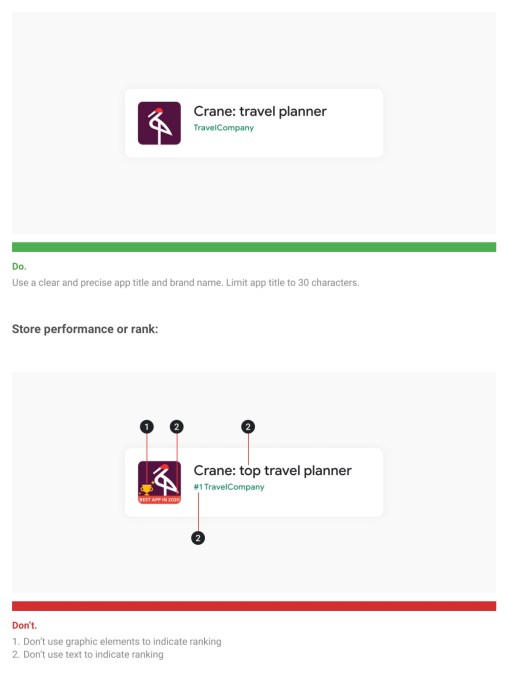
Image Credits: Google
Adtech
Advertisers told The WSJ that Apple’s ATT gives Apple’s own advertising system a competitive advantage. The adtech industry, which is reeling from Apple’s changes to tracking — it’s giving users the ability to opt-out of being tracked — is making the point that there’s something in it for Apple, too, when ATT goes live.
German advertisers filed an antitrust complaint over ATT, saying the changes will negatively affect their industry with up to a 60% fall in ad revenue. Nine industry associations were behind the complaint, representing other tech giants, like Facebook, and publisher Axel Springer.
Facebook warned investors of “increased ad targeting headwinds in 2021” during its earnings call this week, mainly because of the new version of iOS and its launch of ATT. It also sent a memo to advertisers that detailed how ATT would restrict the availability of ad targeting and analytics tools, and impact audience engagement.
Augmented reality

Image Credits: Apple
Apple updated its Clips app (ver 3.1) to allow users to scan spaces using the LiDAR Scanner on iPhone 12 Pro and iPad Pro models in order to apply video effects to their recordings.
Fintech
Google Pay announced a series of updates for its recently revamped payments app, which include new options for grocery savings, paying for public transit and categorizing your spending. With its redesign, the app is being positioned as a key way for brands and businesses to reach customers with offers at a time when Apple is cracking down on third-party tracking.
MetaMask, the Ethereum wallet app and browser extension, said its MAUs grew 5x since October 2020 to reach 5 million monthly active users.
Social
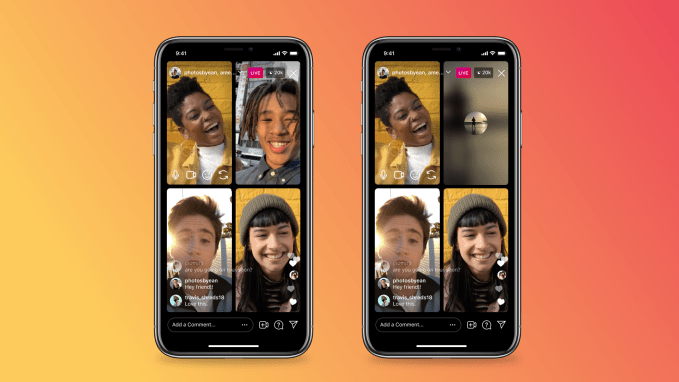
Image Credits: Instagram
Facebook turns Instagram toward the Clubhouse threat. The company this week announced Instagram Live users could now mute their mics and turn off their videos, which gives the live experience a more casual — and yes, Clubhouse-like, appeal.
Social networking app for women, Peanut, adds live audio rooms. The feature is somewhat like Clubhouse, but without a “stage” or clout-chasing and with topics that appeal to women.
Snapchat now has more Android users than iOS, the company noted during earnings. In Q1 2021, Snapchat reached 280M DAUs, up 22% YoY.
TikTok said it’s opening a “transparency center” in Europe that will allow outside experts to see how TikTok approaches content moderation and recommendations, as well as security and privacy. The company opened a center like this in the U.S. last year following censorship allegations.
TikTok formally announced its new CEO and COO, in a strategic reorg. ByteDance’s CFO Shouzi Chew will now also become CEO of TikTok. Vanessa Pappas, who has served as interim CEO after Disney vet Kevin Mayer’s departure, will take the role of TikTok COO, and continue with her current responsibilities.
Messaging
Telegram says it will add group video calls next month. It has also now added the ability for merchants to natively accept credit card payments in any chat through integrations with eight third-party providers, including Stripe, as well as scheduled voice chats, mini profiles for voice chats and new web versions.
Facebook disclosed there are now 1 million businesses using WhatsApp’s “click to WhatsApp” ads, and announced a new feature that will allow businesses to turn items in the WhatsApp Business Catalogs into Facebook or Instagram ads, saving steps.
Streaming & Entertainment
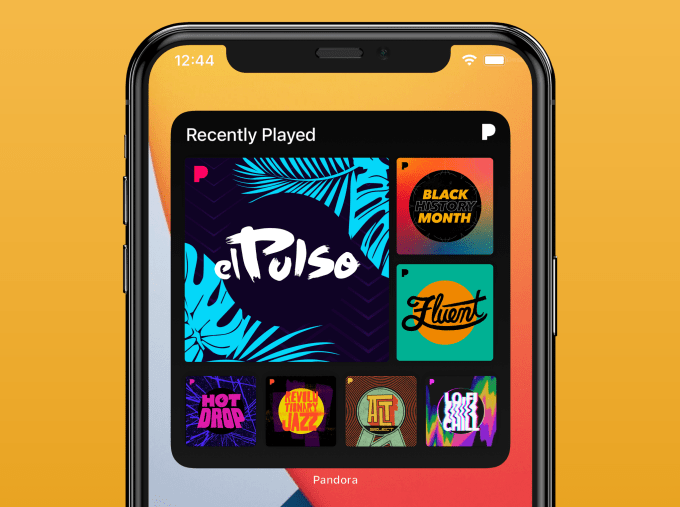
Image Credits: Pandora
Pandora finally has an iOS home screen widget. What took it so long? The widget comes in three sizes and lets users view and play as many as seven of their most-recently played songs, albums, stations, playlists or podcasts.
The Bally Sports app, which is replacing Fox Sports GO, has now arrived. The app offers livestreamed games, tracks scores, states and standings, and offers game previews and highlights from games.
Dating app S’More is pivoting to become more of a “lifestyle brand” by adding a new feature called S’More TV which will stream dating-related interviews with celebs, like WWE and reality TV stars. The video content could then serve as a conversation starter — something Tinder has done in the past with its interactive series “Swipe Night.”
Clubhouse partners with the NFL for draft week programming. This is the first sports partnership for the audio app and saw the NFL creating a series of draft-themed rooms throughout the week.
Spotify says it will rename Locker Room service (the live audio app and Clubhouse rival it just acquired) “Spotify Greenroom.” The company told investors live audio could mean more than spoken word content — it could also include early previews of new albums, too.
Spotify redesigns “Your Library.” The new version ditches the big tabs at the top for “Music” and “Podcasts” each with their own subsections, for a scrollable horizontal row that places all the content sections on one screen. These work as dynamic filters, allowing you to narrow down your searches. There’s also a grid view available and better sorting options.
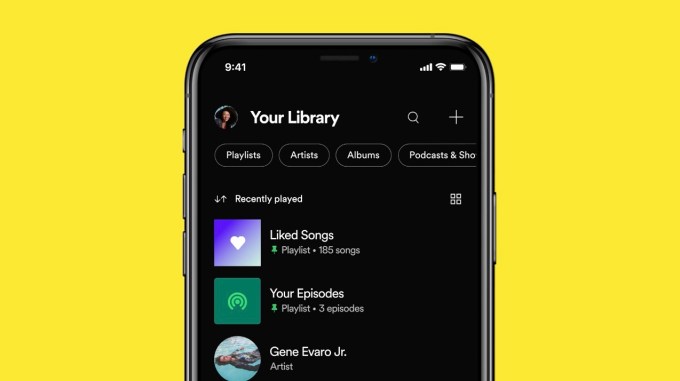
Image Credits: Spotify
Health & Fitness
Uber is offering its app to allow customers to schedule their COVID-19 vaccine appointments at nearby Walgreens in the U.S. Uber had previously introduced free and discounted rides to vaccine appointments with the goal of getting essential workers inoculated.
Security
A popular Android app for writing JavaScript code, DroidScript, had its Google advertising suspended and was then removed from the Google Play Store for ad fraud. The founder of the nonprofit DroidScript.org behind the app asked Google for an explanation and got no response, he said. The app was used by over 100K developers, students and professionals.
Researchers said that hundreds of preinstalled apps on Android devices would have access to a log on users’ phones where the sensitive contract tracing information was stored. Google didn’t offer a reward payout for the finding, saying that system logs haven’t been readable by unprivileged apps since the early days of Android.

Image Credits: Current
💰 Mobile bank Current raised $220 million in Series D funding after growing its user base to nearly 3 million. The funding was led by a16z and tripled Current’s valuation from the end of last year to now $2.2 billion.
💰 Teen banking app Step raised $100 million in Series C funding led by General Catalyst, after growing to 1.5 million users in six months post-launch. The company also announced Steph Curry as an investor.
💰 Kid-focused fintech Greenlight raised $260 million in Series D funding, doubling its valuation to $2.3 billion. Its round was also led by a16z, which backed Greenlight’s rival, Current.
💰 Vivid Money raised $73 million in Series B funding (€60 million) led by Greenoaks to build a European financial super app.
🤝 Snap acquired 3D mapping developer Pixel8earth for $7.6 million. The small team will build out tools that will work with Snapchat’s location-based augmented reality experiences.
💰 Kaia Health raised $75 million in Series C funding led by an unnamed growth equity fund for its digital therapeutics service that offers virtual therapy via an app for musculoskeletal conditions, chronic obstructive pulmonary disease (COPD) and osteoarthritis.
🤝 Family tracking app Life360 will acquire wearable location device Jiobit for $37 million. The figure is primarily in stock and debt, but if Jiobit can maintain its existing triple growth rates over the next two calendar years following the deal’s close, the deal price could increase to $54.5 million. The wearable will be added to Life360’s service to allow tracking of those without phones, including pets.
🤝 Zynga, via its subsidiary Rollic, acquired Uncosoft, the Turkish game developer behind the hit title High Heels, which has been downloaded over 60M times since its January debut, thanks in part, to TikTok. Deal terms were not available.
💰 Montreal-based Botpress raised $15 million in Series A funding from Decibel and Inovia Capital to help developers build more conversational apps.
OnMail
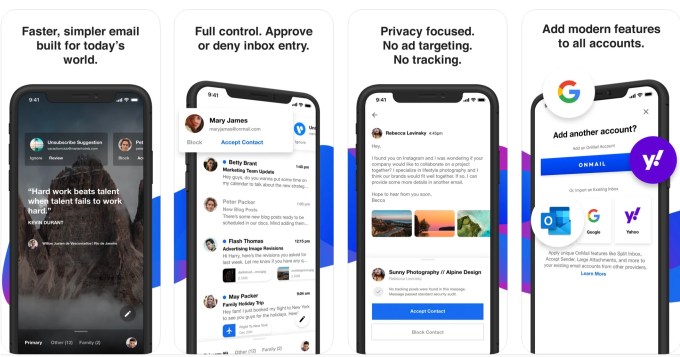
Image Credits: OnMail
The makers of a popular email app Edison Mail have now launched another email app, OnMail. This new iOS app is designed to solve more difficult email problems, like handling overloaded inboxes and mail that spies on you. The app will automatically block tracking pixels (read receipts), suggest emails to unsubscribe from, index your entire history for faster searches, stop ad targeting, and more. Like Basecamp’s Hey, users can also decide who can or cannot enter their inbox, too. And when you want to see your promotions, they’re provided in a visual feed that’s more engaging.
The service, which is also available on the web, works with OnMail email addresses, as well as other accounts like those from Microsoft, Google and others. It will later introduce an Android app, calendar support, Yahoo and Microsoft Exchange support, and two-factor. The company says your name and email is never shared, but it does use anonymized data as part of its Edison Trends (digital commerce) research — users are opted in, but an opt out is available.






































